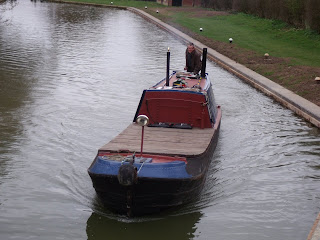The canal reservoirs in the South are at about half the
capacity that they were at this time last year –some are virtually empty. There
are restrictions on the hours of usage of the major flights of locks to make
people share locks, and so that boats going up swap with boats going down.
There have been teams of volunteer lock keepers recruited.
We spent the night at the bottom of Stoke Bruerne Locks
waiting for the flight to be unlocked in the morning.
 |
| Heading up Stoke Bruerne Flight |
At five to ten the BW man arrived to unlock the gates. So, we
set off immediately with another boat that had arrived behind us an hour or so
earlier. As we started off up the flight
a BW trainer with a team of volunteer lock keepers arrived having walked down
from the top. They shadowed us the whole
way up the flight, with the trainer explaining how to work the locks, how to
let water down into a pound that is low, and all the other things that the
volunteers will need to know while they help in their role of tackling the
drought conditions.
 |
| Training the volunteer lock keepers |
The trainer explained clearly and patiently, but we were
surprised that none of the volunteers actually seemed to know very much
already. We had made the assumption that they would all be experienced boaters,
but clearly not. Locks can be dangerous places, so the volunteers will need to
work calmly and safely, but we and the other boater travelling with us were
surprised at how slowly they were being trained to do things. Paddles were
going up very slowly, it seemed to take ages to get the gates open and the
boats out of the locks. It is a difficult thing, BW has to make sure that the
volunteers are trained to work safely, but we could see potential arguments
developing in the future with experienced boaters being told that they can’t
work locks as quickly as they are used to doing.
Into the tunnel – this time I stayed in the cabin, instead
of sitting on the tug deck with a lantern. I got the washing up done, then
washed down the ceiling and a lot of the cabin walls. I felt very virtuous,
like a real boatwoman.
 |
| In Blisworth, a provisioning stop |
A quick stock up of milk, cheese and butter at Blisworth,
then on through many miles of lockless canal. I put a couple of baking potatoes
into the oven, turning them occasionally, and checking their progress. After
two hours we had some of the best baked potatoes I’ve eaten in ages.
We took turns at steering, with Alan getting a cheeky ‘Slow
down!’ from Dominic Miles at Stowe Hill Wharf. Shortly afterwards a small boat
did a U-Turn in front of Sickle – sticking his arm out and just turning across
our bows. Obviously he doesn’t have much idea of what it’s like steering an old
boat, but Alan managed to pull up in time, and avoid hitting him
broadside. In Weedon we passed another
friend from the Canal World Forum, Keith (Jelunga).
 |
| In the queue for the locks at Whilton |
We stopped at the bottom of the Whilton/ Buckby flight of
locks, immediately behind another boat on the lock landing. Once tied up I got
busy cooking, although I haven’t completely got the measure of the stove yet. I
didn’t have it quite hot enough and the food was a long time before it was
ready.
We only have one battery, which we cannot allow to run low
in the evening with running lights, etc., otherwise we won’t be able to start
Sickle in the morning, so we don’t stay up late. To be honest, I am tired after
a very busy term, so I’m likely to just fall asleep on the side bed, and have
to get up to go to bed later. However, we were surprised that as we were midway
between the West Coast Mainline and the M1, each only a couple of hundred
metres either side, that it was far quieter than we would have predicted.
Stoke Bruerne Bottom Lock to Whilton Bottom Lock
Miles: 15.6, Locks: 7
Totals for extended trip....
Miles: 32.4 Locks: 8
We did this stretch going south on the same day, and I was wondering how we managed to pass without me noticing. Then I realised that we must have passed you in the tunnel - we certainly crossed with an old boat with a loud engine! We'd have been the second boat you passed, the one in front of us seemed to slow down enormously as you crossed.
ReplyDelete